First collection by La Vague
Product news: a clock with disappearing hands and pen pots made of heat-shrink tubing are among the objects in the first collection from La Vague, a new online shop and collective offering work by young designers.
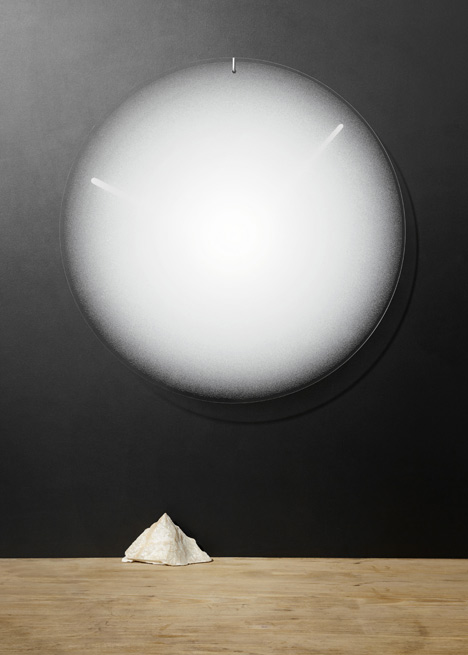
Above: Sfumato by Linn Kandel. This wall clock creates an artificial blur by making the watch hands disappear gradually. The mechanism is concealed behind a Plexiglas dial which is gradient printed.
Based in Switzerland, La Vague describes itself as "a platform that edits self-produced objects", and its first collection comprises nine pieces by young designers.
"We decided to launch La Vague to have the chance to create and sell our design and the designs of young designers who are quite unknown but very talented," said designer Charlotte Talbot. "When you buy an object today you should know where it is coming from, who made it and where your money goes. You buy a La Vague object because you like the design, but maybe also to support a new way of consumption."
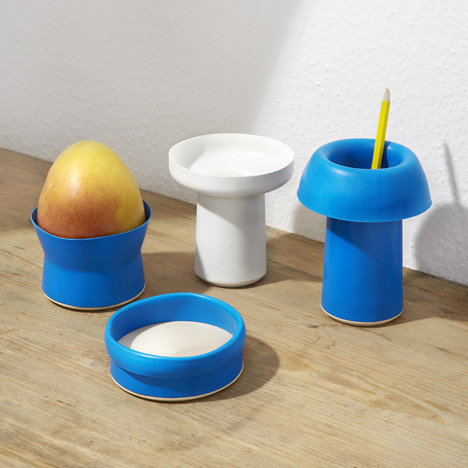
Above: Gaignal by Dimitri Bähler. Gaignal is a storage set for pens and office stationery. The shapes come from the used material's maximal capacities; thermo shrinkable tube. The base is made of turned maple.
"To develop the first collection of La Vague, we didn't give a topic to the designers, but they had to create objects that could be made by themselves or by a craftsman, produced locally and easy to ship," said Linn Kandel's, one of the curators of the collection.
"Those points resulted in a series of objects which included various pieces made out of materials that are easy to handle, such as wood, rope, aluminium, Tyvek, carbon – simple shapes with a strong aesthetic."
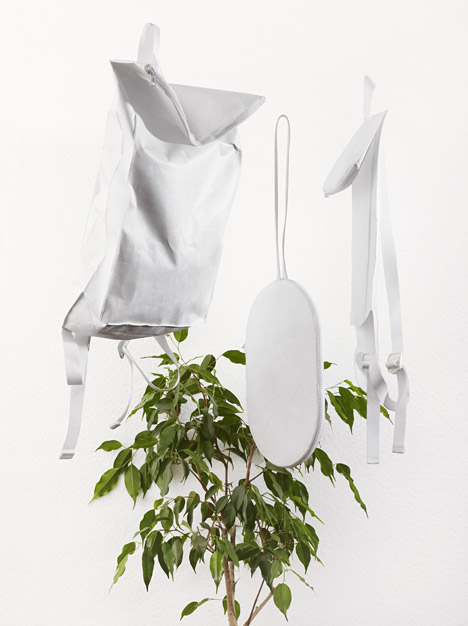
Above: Sac à dos - Pochette bags by Linn Kandel. These two bags offer with their small volume the possibility to be used everyday. Made out of Tyvek – a very strong, light and waterproof material – these bags propose a more durable but also aesthetic alternative to paper bags.
Some objects are handmade or assembled by the designers in limited editions, but others, like the Volet hooks, are produced industrially.
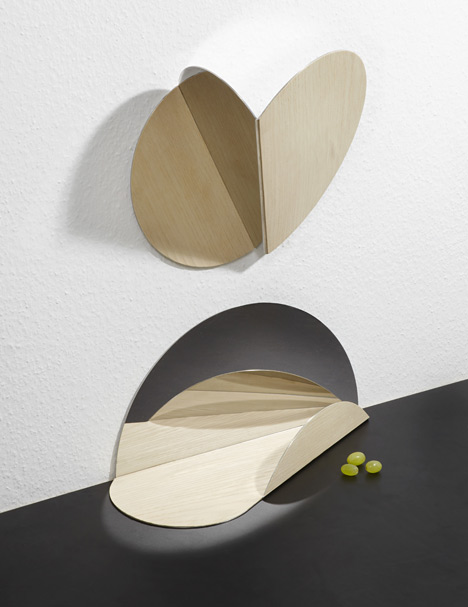
Above: Deadaleas by ECAL/Fanny Dora. Deadaleas is a book holder and wall shelf. The meeting of wood and mirrored inox is a game of appearance and disappearance that influences the perception of the two objects.
Among the collection are Dimitri Bähler's containers for pens and stationery, made from heat-shrink tubing and turned maple, and Linn Kandel's blurry wall clock, which has its hands concealed by gradient-printed Plexiglas.
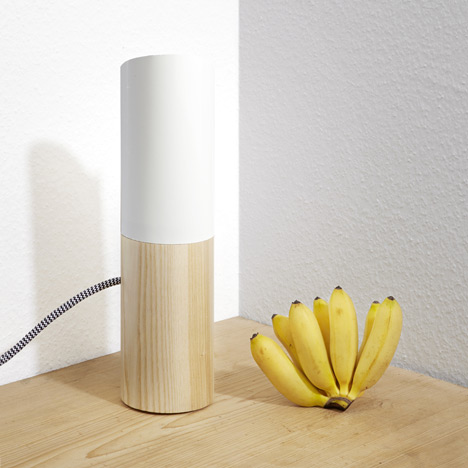
Above: Tronc by Charlotte Talbot. Lamp with an indirect and soft lightening perfectly suited for a bedside lamp. The base is made out of ash and the lampshade out of white polypropylene.
The collection also includes a pair of bags made from the durable, paper-like material Tyvek, also by Kandel, and two small shelves made of ash and mirrored stainless steel, credited to Fanny Dora with the University of Art and Design Lausanne (ECAL).
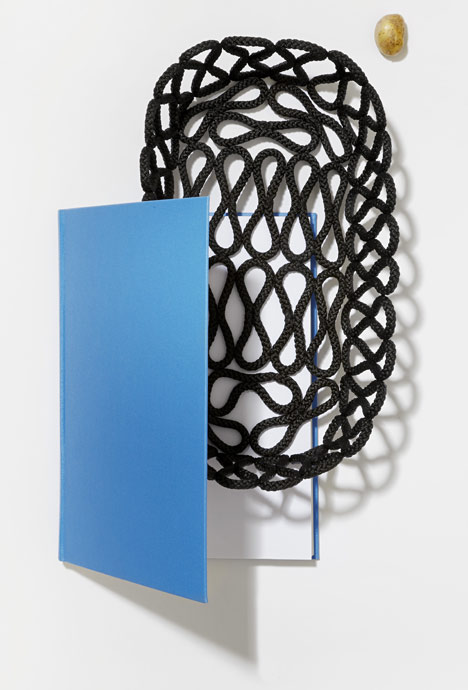
Above: Node by Charlotte Talbot. Node is a hand-made basket constructed with hardened polypropylene rope. It can be used to put objects in or as a fruit basket.
Charlotte Talbot designed an ash and polypropylene bedside lamp and a flexible basket of polypropylene rope, while the wooden table clock is by Anurag Etchepareborda.
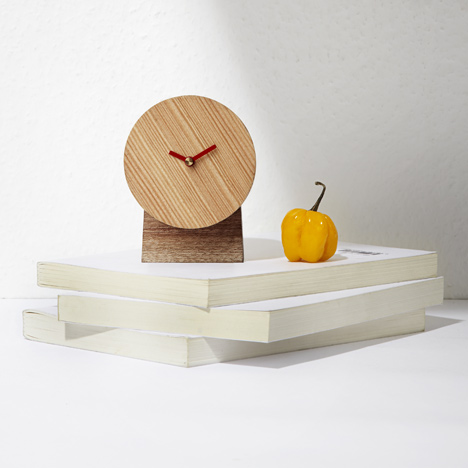
Above: Kitchen Clock by Anurag Etchepareborda. This little table clock's radical and simple design allows the user to contemplate an aesthetic purely based on the quality of the wood.
Completing the collection are Bähler's anodised aluminium hooks, which fold over to hide their screws, and a balancing sculpture made from pieces of ash and rings of carbon by Jean Besson and ECAL.
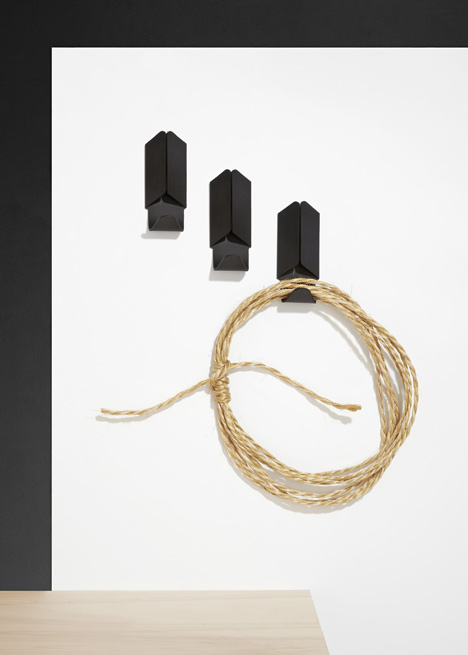
Above: Volet by Dimitri Bähler. Anodised aluminium hooks folded in way to hide the fixation system, which is a simple screw giving a unexpected volume of the object.
All of the objects are available online from La Vague. The second collection will be presented in the coming months, while the objects will also be sold by Berlin concept store Baerck.
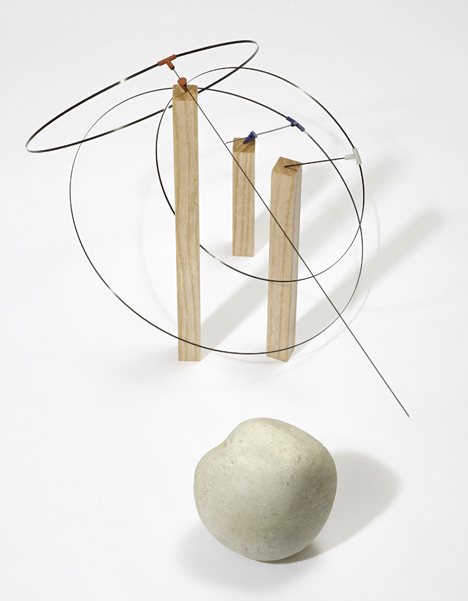
Above: Round & Round by ECAL/Jean Besson. Balancing object made out of a section of ash and a carbon profile in several dimensions. Little plastic elements are used for connecting the parts together.
Another project by Kandel we've featured on Dezeen is a series of wire-framed tables inspired by electricity pylons.
See all our stories about homeware »
See all our stories about design »
Photography is by Charles Negre and captions are by La Vague.
Here's some more information from La Vague:
La Vague is a platform that edits self produced objects. From the idea to the delivery, the designers are in control. Produced by craftsmen, local factories, or the designers themselves, the La Vague objects are distributed during events or through its website: www.la-vague.ch
As young designers, even a beautiful, original and well designed object is hard to promote. By trusting young creators, La Vague breaks the fence and gives them an opportunity to promote and sell their objects without any intermediates. In that sense, La Vague wants to be a new kind of furnishing and object company.
As a self-produced object company, La Vague can propose several objects with different levels of production. Some mass produced, others almost unique pieces. Thanks to that approach, La Vague has the ambition to sell only unpublished objects at very affordable prices. Unique objects created by talented designers.
» Dimitri Bähler
» Anurag Etchpareborda
» Anne Julmy
» Linn Kandel
» Charlotte Talbot